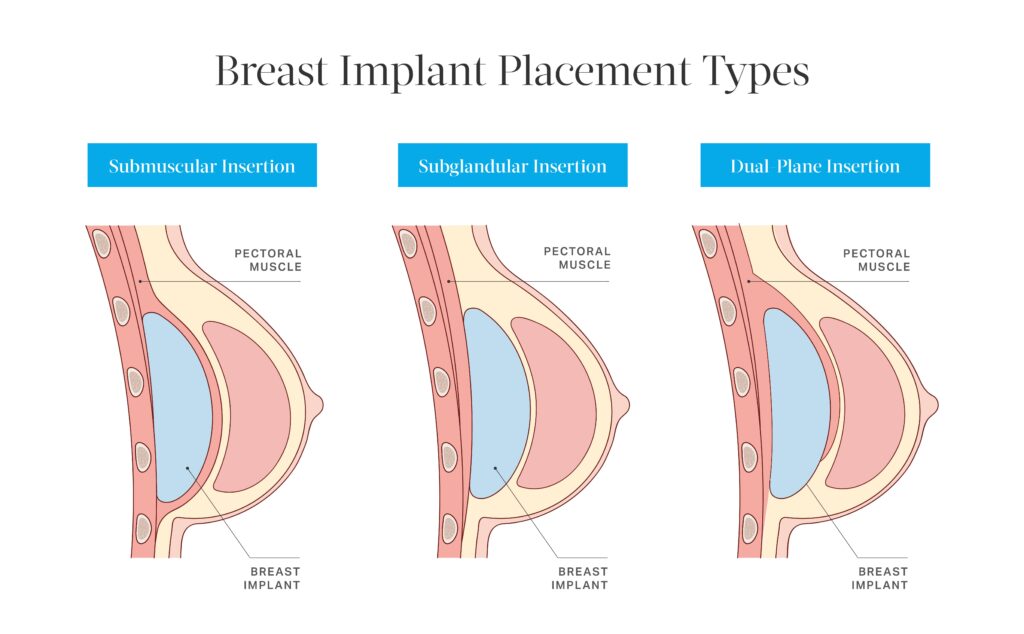February 25th, 2025
Dr. Mulholland, Md
If you’re a new or expecting mother with breast implants, you may be wondering, can you breastfeed with implants? While most women with breast implants can breastfeed with no problems or complications, there are a few factors that can impact milk production and cause discomfort.
In this article, we’ll explore the key considerations and challenges new mothers may face with breast implants and breastfeeding. Here’s everything you need to know:
How Breast Implants Can Impact Breastfeeding
In a recent study that looked at 3,500 women who were breastfeeding, insufficient milk production was the most common complication for women with breast implants. Several surgical and non-surgical factors can impact milk supply. This includes:
Surgical Techniques
The surgical techniques used during breast implant surgery can influence milk supply. If the plastic surgeon uses incision placement techniques for the procedure, it can damage the milk ducts and nerves.
This is most common during a periareolar placement. During a periareolar placement, a small incision is made around the areola. While the scars are hidden, the procedure can cause damage to the milk ducts or the nerves. Nerve damage from surgery can also inhibit milk production and cause nipple sensitivities.
Research also showed that sub or inframammary incisions were associated with a reduction in exclusive breastfeeding compared to women with breast implants.
Placement
The safest technique used is below-muscle implant placement. In this surgical procedure, the implant is placed under the muscle, which is less likely to interfere with milk production. Above-the-muscle placements can put too much pressure on the milk ducts, causing a reduction in supply.

Type of Implants
Studies suggest that different types of implants can impact milk supply as well. In a recent study, patients with a retro glandular implant were significantly less able to breastfeed compared with the patients with neuromuscular implants. It’s also estimated that around 28-64% of women with gel or silicone breast implants experience lactation insufficiencies.
Underdeveloped Breast Tissue
Women who have underdeveloped breast tissue before surgery may struggle with supply regardless of whether they have implants or not.
Is Breastfeeding Safe for Babies If You Have Implants?
Yes, breastfeeding with implants is considered generally safe for the baby. There are also no clinical reports of health problems for babies or mothers.
Do Breast Implants Affect Breast Milk Composition?
There are some concerns about silicone seeping into breast milk. However, research shows no increased silicone levels in the breast milk of women with implants compared to those without. In fact, silicone in the formula is higher than in breast milk.
Are There Any Health Risks for Infants?
No, there is no medical evidence to suggest breastfeeding with implants is harmful to infants. The American Academy of Pediatrics also supports breastfeeding with implants.
Common Challenges and How to Overcome Them
Even though breastfeeding with implants is considered generally safe, some mothers still face challenges caused by the procedure. That’s why it’s important to always go to a reputable, board-certified plastic surgeon with the right skills and expertise. Some risks associated with breastfeeding with implants include:
Low Milk Supply & Supplementing
If you’re worried about your milk supply, monitor your baby’s weight gain and consider working with a lactation consultant. A lactation consultant can help with infant weight gain, pain, and inflammation and assess your milk supply. Supplementing with formula can also ensure your baby is getting enough milk.
Breastfeeding Discomfort & Engorgement
Breast implants can also increase breast sensitivity, causing nipple pain and discomfort during engorgement. Applying a cool compress to your nipples can help relieve pain or discomfort. There are also nipple creams and natural oils that can help with any nipple sores, cracks, or inflammation.
If you’re struggling with engorgement, you may need to breastfeed more often. You can also gently massage your breasts to eliminate any discomfort.
What to Do If You’re Considering Breast Implants and Want to Breastfeed in the Future
If you’re considering breast implants and breastfeeding, the first step you’ll need to take is to schedule a consultation with a board-certified plastic surgeon like Toronto Plastic Surgeons. Toronto Plastic Surgeons will provide expert recommendations based on your anatomy and desired results. He’ll also offer a personalized treatment plan using implant placement and incision techniques that will minimize the impact on lactation.
If you’re also looking to improve breast shape and fullness, a breast lift with implants may provide the results you’re after, especially if you’ve experienced sagging post-pregnancy.
Alternative Options If Breastfeeding Is Difficult
Pumping and combination feeding are typically recommended for women with a low milk supply. This is the best way to ensure your infant is getting enough nutrients.
If you’re worried breastfeeding will be too difficult with breast implants, another alternative is a fat transfer breast augmentation. During this procedure, a plastic surgeon will use liposuction to remove fat cells from the hips, thighs, or stomach area and inject it into the breasts. This procedure can help you achieve natural-looking breasts and has a quicker recovery time than breast implants.
For women interested in comprehensive body contouring beyond breast augmentation, belt lipectomy can help address excess skin and fat in the midsection – often a concern after pregnancy.
Conclusion & Next Steps
Many women with breast implants have no problem with breastfeeding. However, if you’re struggling with any of the risks associated with breastfeeding with implants we listed above, consider scheduling a consultation with a lactation consultant to discuss options and alternatives.
If you’re considering a breast implant and want to ensure that the surgical techniques used during the procedure won’t interfere with your milk supply, schedule a consultation with Toronto Plastic Surgeons.
If you’re navigating postpartum changes and considering procedures that restore your pre-pregnancy body, explore our Mommy Makeover procedure – a customizable treatment plan designed for mothers just like you.



